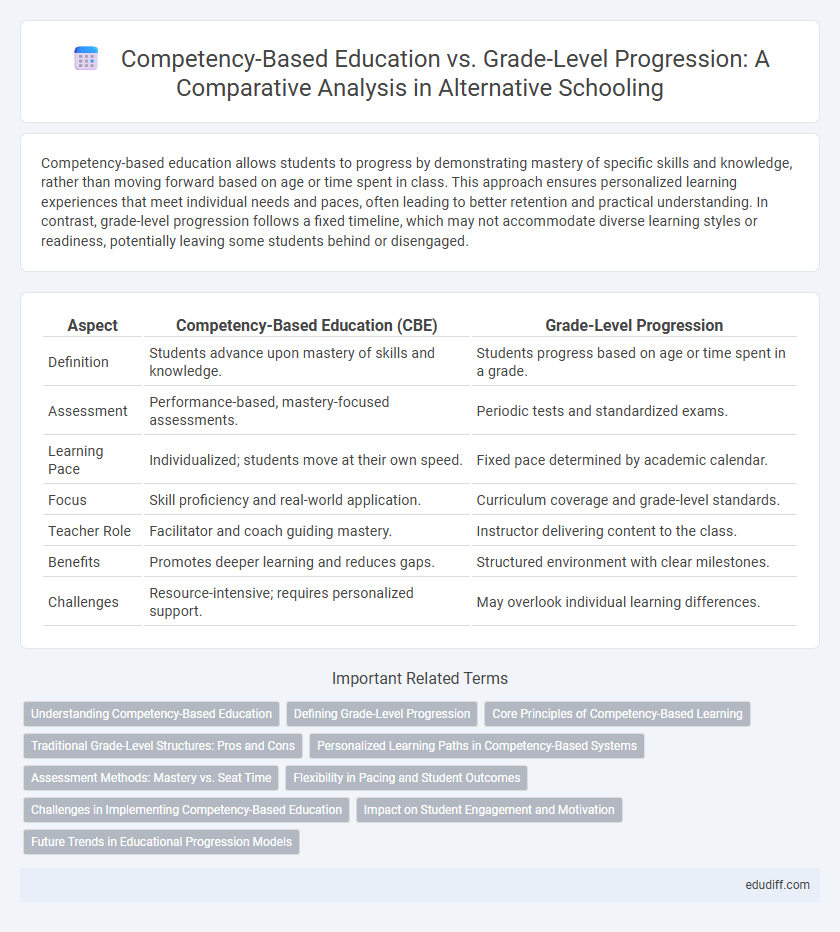Competency-based education allows students to progress by demonstrating mastery of specific skills and knowledge, rather than moving forward based on age or time spent in class. This approach ensures personalized learning experiences that meet individual needs and paces, often leading to better retention and practical understanding. In contrast, grade-level progression follows a fixed timeline, which may not accommodate diverse learning styles or readiness, potentially leaving some students behind or disengaged.
Table of Comparison
| Aspect | Competency-Based Education (CBE) | Grade-Level Progression |
|---|---|---|
| Definition | Students advance upon mastery of skills and knowledge. | Students progress based on age or time spent in a grade. |
| Assessment | Performance-based, mastery-focused assessments. | Periodic tests and standardized exams. |
| Learning Pace | Individualized; students move at their own speed. | Fixed pace determined by academic calendar. |
| Focus | Skill proficiency and real-world application. | Curriculum coverage and grade-level standards. |
| Teacher Role | Facilitator and coach guiding mastery. | Instructor delivering content to the class. |
| Benefits | Promotes deeper learning and reduces gaps. | Structured environment with clear milestones. |
| Challenges | Resource-intensive; requires personalized support. | May overlook individual learning differences. |
Understanding Competency-Based Education
Competency-Based Education (CBE) emphasizes mastery of specific skills and knowledge rather than time spent in a grade level, allowing students to progress at their own pace. This approach assesses students through demonstrated competencies, ensuring they have acquired essential abilities before moving forward. CBE fosters personalized learning pathways, promoting deeper understanding and practical application of content compared to traditional grade-level progression.
Defining Grade-Level Progression
Grade-level progression is a traditional educational model where students advance to the next grade after completing the prescribed curriculum and time spent in each grade, regardless of individual mastery. This system emphasizes age-based cohorts and standardized benchmarks, often leading to promotion based on seat time rather than demonstrated competency. Critics argue it may hinder personalized learning by overlooking unique student needs and pacing.
Core Principles of Competency-Based Learning
Competency-Based Education (CBE) centers on mastering specific skills and knowledge at an individual pace, contrasting with traditional Grade-Level Progression, which advances students based on age or time spent in class. Core principles of CBE include personalized learning pathways, clear demonstration of competence, and flexible assessment methods that prioritize mastery over seat time. This approach ensures learners achieve real-world readiness by progressing only when they have demonstrated proficiency in targeted competencies.
Traditional Grade-Level Structures: Pros and Cons
Traditional grade-level progression structures offer clear benchmarks for student achievement and facilitate standardized curriculum delivery across schools. However, this system often fails to accommodate individual learning paces, potentially leading to disparities in student comprehension and engagement. Competency-based education addresses these limitations by allowing students to advance upon mastery of skills, promoting personalized learning but challenging standardization and resource allocation.
Personalized Learning Paths in Competency-Based Systems
Competency-based education prioritizes personalized learning paths, allowing students to progress upon mastery of skills rather than age or grade level. This approach tailors instruction to individual strengths and gaps, fostering deeper understanding and skill retention. Personalized pathways in competency-based systems enhance student engagement and better prepare learners for real-world challenges by focusing on demonstrated competencies.
Assessment Methods: Mastery vs. Seat Time
Competency-Based Education (CBE) emphasizes mastery through personalized assessments that require students to demonstrate understanding and skills before advancing. Grade-Level Progression relies on seat time, advancing students based on the duration spent in a grade regardless of their mastery level. Assessment methods in CBE provide targeted feedback and support, fostering deeper learning compared to time-based evaluations.
Flexibility in Pacing and Student Outcomes
Competency-Based Education (CBE) offers flexible pacing by allowing students to progress upon mastery of skills, unlike traditional Grade-Level Progression which advances students based on age or time spent in class. Research indicates that CBE improves student outcomes by providing personalized learning paths that address individual strengths and weaknesses. This approach fosters deeper understanding and retention, resulting in higher academic achievement and readiness for college or career.
Challenges in Implementing Competency-Based Education
Implementing Competency-Based Education (CBE) faces challenges such as aligning assessment methods with individualized learning paths, ensuring teacher preparedness to facilitate personalized instruction, and managing resource allocation to support diverse student pacing. Schools often struggle with integrating flexible standards that differ from traditional grade-level progression benchmarks, complicating curriculum design and administrative tracking. Limited technological infrastructure and resistance to change among stakeholders further impede the effective adoption of CBE models.
Impact on Student Engagement and Motivation
Competency-based education enhances student engagement by allowing learners to progress at their own pace, ensuring mastery of skills before advancing, which fosters motivation through personalized achievement. In contrast, grade-level progression often imposes uniform timelines that may leave students behind or unchallenged, potentially diminishing interest and enthusiasm. Personalized feedback and goal-setting in competency-based models significantly boost intrinsic motivation compared to traditional grade-based systems.
Future Trends in Educational Progression Models
Competency-based education (CBE) emphasizes mastery of skills at an individualized pace, contrasting with traditional grade-level progression that advances students based on age or time spent in class. Emerging trends indicate a shift towards hybrid models integrating CBE principles with personalized learning technologies to enhance flexibility and learner engagement. Data-driven assessments and adaptive curricula are expected to drive future educational progression, aligning student outcomes with workforce demands more effectively.
Competency-Based Education vs Grade-Level Progression Infographic

 edudiff.com
edudiff.com